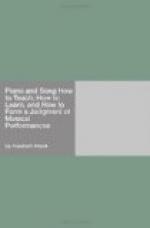Third Lesson. Other little exercises; trills, scales with shading for one hand alone and for both together; the skipping basses, &c. We will begin to-day with the bass part of the second variation. You observe that often there are even eighth notes in the treble, while in the bass there are even triplet eighth notes. In order to play these properly together, even with only mechanical correctness, it is necessary that the left hand shall acquire a perfectly free and independent movement, and shall bring out the bass with perfect ease. You must pay special attention to any weak notes, and accustom yourself not to give the last triplet, in each bar, and the last note of this triplet, too hurriedly, too sharply, or with too little tone. Notice how much difficulty this equal playing of the triplets occasions to the right hand, which moves in even eighth notes. While you play the left hand, I will play the right: you must listen as little as possible to my playing, and preserve your own independence. You must learn to play this variation entirely by yourself with both hands together; but we must not be too much in a hurry about it, and must give time to it. All restless urging, all hurry, leads to inaccuracies in playing. You have learned enough for to-day; but you may play the other variations, with the whole finale, straight through, that you may not get into the habit of stopping at the difficult passages which you have already learned.




